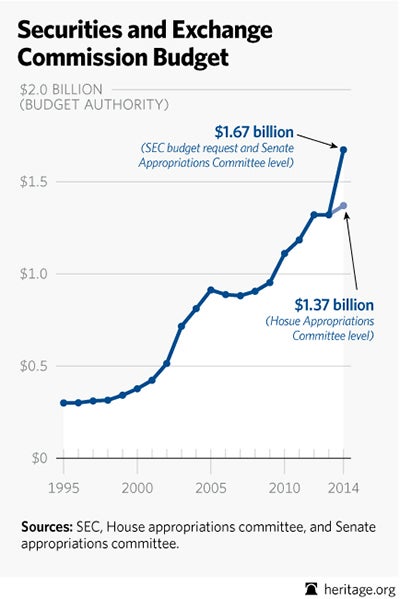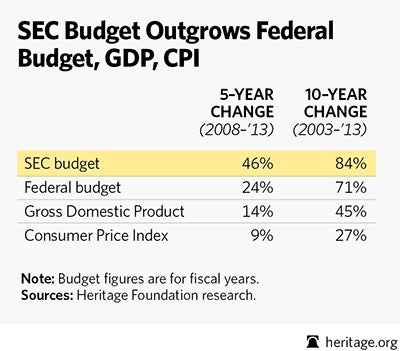Lack of Resources Is Not the Reason for SEC Tardiness
David Burton /
During a recent House Financial Services Committee mark-up, a number of members complained that the Securities and Exchange Commission (SEC) was “slow walking” the regulations necessary to implement the very positive and bipartisan Jumpstart Our Business Startups (JOBS) Act enacted in 2012.
The SEC opposed most provisions in the JOBS Act before it was enacted, so there is some concern that the implementation delay is partially a function of SEC opposition to the law.
Other members excused the delays by opining that the SEC has severe budget constraints. The agency, of course, wants “additional resources” to implement the JOBS Act and for a wide variety of other purposes.
The truth is that the SEC budget has grown incredibly quickly for a very long period of time. There really is no reason to believe that a lack of money is the cause of the agency’s problems. In fact, the huge budget increases appear to have made the SEC unwieldy and unresponsive, particularly when it comes to writing rules.
Unnecessary complexity and a surfeit of participants in the rule-making process are causing much of the delay. For example, the SEC is implementing a two-page law (Title II of the JOBS Act) with many dozens of pages of microtype in the Federal Register (the accreditor investor verification rules and proposed Regulation D amendments). An eight-page statute (the crowdfunding provisions of the JOBS Act) has led to a 585-page SEC document proposing rules to implement it.
Over the past five years, the SEC budget has grown nearly twice as quickly as the overall federal budget, more than three times as fast as the economy, and five times the rate of inflation. Over the past 10 years, the SEC budget has growth faster than the rest of the federal government, nearly twice as fast as the economy, and three times the rate of inflation.
Since 1995 (18 years), the annual growth rate in the SEC budget has averaged 8.5 percent. If its fiscal year (FY) 2014 budget request is approved, the annual growth rate will increase (in the 19 years since 1995) to 10 percent.
The SEC has requested a budget for FY 2014 that is 22 percent higher than in FY 2013. It is seeking to increase its personnel from 4,223 in FY 2013 to 4,638 in FY 2014, an increase of 10 percent in one year. In FY 2012, SEC personnel numbered 3,770.
Whatever the reason that the SEC can’t write the rules in a timely manner, one thing is clear: It is not due to a lack of resources.


